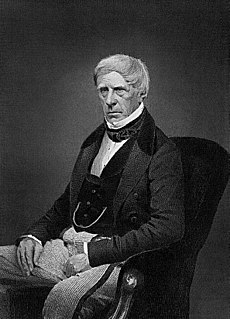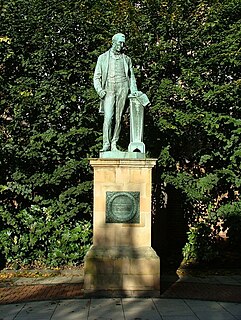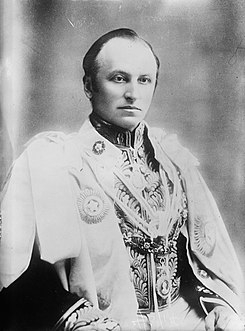Related Research Articles

Viscount Cobham is a title in the Peerage of Great Britain that was created in 1718. Owing to its special remainder, the title has passed through several families. Since 1889, it has been held by members of the Lyttelton family.

Marquess of Londonderry, of the County of Londonderry, is a title in the Peerage of Ireland.

Baron Burgh is a title that has been created twice in the Peerage of England.

Baron Dudley is a title in the Peerage of England. It was created circa 1440 for John Sutton, a soldier who served as Lord Lieutenant of Ireland. The title descended in the Sutton family until the 17th century when Frances Sutton, the heir apparent to the title, married Humble Ward, who, himself, was granted the title Baron Ward in 1644. Their heirs inherited both titles until 1740 when the differing rules of inheritance meant that the Barony of Dudley descended on Ferdinando Dudley Lea, who became the 11th Baron whilst the Barony of Ward went to John Ward, who later became 1st Viscount Dudley and Ward. On Ferdinando's death in 1757, the title fell into abeyance. The title was revived in 1916.

Earl of Ducie is a title in the Peerage of the United Kingdom. It was created in 1837 for Thomas Reynolds Moreton, 4th Baron Ducie. The family descends from Edward Moreton, who married Elizabeth, daughter of Robert Ducie. Their son Matthew Ducie Moreton represented Gloucestershire in the House of Commons. In 1720 he was raised to the Peerage of Great Britain as Baron Ducie de Moreton, in the County of Stafford. He was succeeded by his son, the second Baron. He was also a Member of Parliament and served as Lord-Lieutenant of Gloucestershire. In 1763 he was created Baron Ducie, of Tortworth in the County of Gloucester, with remainder to the sons of his sister Elizabeth Reynolds. This title was also in the Peerage of Great Britain.

Baron Churchill, of Wychwood in the County of Oxford, is a title in the Peerage of the United Kingdom and held by a branch of the Spencer family. It was created in 1815 for Lord Francis Spencer, younger son of the 4th Duke of Marlborough. He had previously represented Oxfordshire in Parliament.

Viscount Scarsdale, of Scarsdale in Derbyshire, is a title in the Peerage of the United Kingdom. It was created in 1911 for the prominent Conservative politician and former Viceroy of India George Curzon, 1st Baron Curzon of Kedleston, who was created Earl Curzon of Kedleston at the same time and was later made Marquess Curzon of Kedleston.

Baron Carrington is a title that has been created three times, once in the Peerage of England, once in the Peerage of Ireland and once in the Peerage of Great Britain. The first creation came in the Peerage of England in 1643 in favour of Sir Charles Smyth. Only a few days later he was created Viscount Carrington in the Peerage of Ireland. For more information, see this title.

Baron Talbot of Malahide is a title that has been created twice for members of the same family—in 1831 in the Peerage of Ireland as Baron Talbot of Malahide, and in 1856 in the Peerage of the United Kingdom as Baron Talbot de Malahide. While the barony of 1856 became extinct in 1973, the barony of 1831 is extant. The ancestral seat of the family until 1976 was Malahide Castle, close to the village of that name, north of Dublin, Ireland.

Baron Sheffield is a title that has been created four times: once in the Peerage of England, twice in the Peerage of Ireland, and once in the Peerage of the United Kingdom.
Baron Gainford, of Headlam in the County Palatine of Durham, is a title in the Peerage of the United Kingdom. It was created on 3 January 1917 for the Liberal politician Jack Pease, a member of the Darlington Pease family. He notably served as President of the Board of Education from 1911 to 1915. Pease was the second son of Sir Joseph Pease, 1st Baronet, and the grandson of Joseph Pease, while Arthur Pease was his uncle and Sir Arthur Pease, 1st Baronet, Beaumont Pease, 1st Baron Wardington, and Herbert Pease, 1st Baron Daryngton, were his first cousins. The third baron was a former member of the London County Council and of the Greater London Council. As of 2013 the title is held by his younger brother, the fourth baron, an architect and town planner; County Planning Officer for Ross and Cromarty 1967–1975 and Scottish Office Inquiry Reporter 1978–1993.

Baron Killanin, of Galway in the County of Galway, is a title in the Peerage of the United Kingdom. It was created in 1900 for the Irish lawyer and politician Michael Morris, Baron Morris, Lord Chief Justice of Ireland from 1887 to 1889 and a Lord of Appeal in Ordinary from 1889 to 1900. He had already been created a Baronet in the Baronetage of the United Kingdom in 1885, and a life peer under the Appellate Jurisdiction Act 1876 as Baron Morris, of Spiddal in the County of Galway, in 1889. On his death in 1901 the life peerage became extinct while he was succeeded in the baronetcy and hereditary barony by his eldest son, the second Baron. He briefly represented Galway Borough in the House of Commons as a Conservative and also served as Lord Lieutenant of County Galway from 1918 to 1922. He was succeeded by his nephew, the third Baron, the son of George Henry Morris. He was a prominent author, journalist and sports official and served as President of the International Olympic Committee from between 1972 and 1980. As of 2017 the titles are held by his eldest son, the fourth Baron, who succeeded in 1999. He is a film producer.

Baron Brougham and Vaux, of Brougham in the County of Westmorland and of High Head Castle in the County of Cumberland, is a title in the Peerage of the United Kingdom. It was created in 1860 for the lawyer, Whig politician and former Lord Chancellor Henry Brougham, 1st Baron Brougham and Vaux, with remainder to his younger brother William Brougham. He had already been created Baron Brougham and Vaux, of Brougham in the County of Westmorland, in 1830, also in the Peerage of the United Kingdom, with normal remainder to the heirs male of his body.

Baron Burton, of Burton-on-Trent and of Rangemore in the County of Stafford, is a title in the Peerage of the United Kingdom. It was created in 1897 for the prominent brewer, philanthropist and Liberal politician Michael Bass, 1st Baron Burton. He had already been created a baronet in 1882 and Baron Burton in 1886. However, the three titles had different remainders. The Bass family descended from William Bass, who founded the brewery business of Bass & Co in Burton upon Trent in 1777. His grandson Michael Thomas Bass transformed the company into one of the largest breweries in the United Kingdom. He also represented Derby in Parliament as a Liberal for thirty-five years and was a great benefactor to the town of Burton. However, Bass declined every honour offered to him, including a baronetcy and a peerage.
Baron Bruntisfield, of Boroughmuir in the City of Edinburgh, is a title in the Peerage of the United Kingdom. It was created in 1942 for the Scottish Conservative politician and former Vice-Chamberlain of the Household, Sir Victor Warrender, 8th Baronet. The Warrender family descends from George Warrender. He was Lord Provost of Edinburgh and represented Edinburgh in Parliament. In 1715 he was created a baronet, of Lochend in the County of Haddington, in the Baronetage of Great Britain. His grandson, the third Baronet, fought at the Battle of Minden in 1759, represented Haddington Burghs in the House of Commons and served as King’s Remembrancer of the Court of Exchequer from 1771 to 1791. He was succeeded by his son, the fourth Baronet. He sat as a Member of Parliament for Haddington Burghs, Truro, Sandwich, Westbury and Honiton and notably served as a Lord of the Admiralty from 1812 to 1812. In 1822 Warrender was admitted to the Privy Council. On his death the title passed to his younger brother, the fifth Baronet. His grandson, the seventh Baronet, was a Vice Admiral in the Royal Navy. He was succeeded by his son, the eighth Baronet, who was raised to the peerage as Baron Bruntisfield, of Boroughmuir in the City of Edinburgh, in 1942. As of 2010 the titles are held by the latter's grandson, the third Baron, who succeeded in 2007. He is a retired officer in the British Army and investment banker.

Baron Ravensdale, of Ravensdale in the County of Derby, is a title in the Peerage of the United Kingdom.

Baron Hylton is a title that has been created twice, once in the Peerage of England and once in the Peerage of the United Kingdom. The first creation came in the Peerage of England 1295 when Robert Hylton was summoned to the Model Parliament as Lord Hylton by writ. His son, Alexander, was called to Parliament in 1332 and 1335, but no further summons were sent for his descendants. Therefore, the title has only been held de jure after the death of the second baron. Indeed, the last baron was Member of Parliament for Carlisle after "inheriting" the title, due to this anomaly. Despite this, the creation is deemed to have fallen into abeyance on the death of the eighteenth baron without male heirs in 1746.
John Robert Warrender, 2nd Baron Bruntisfield, OBE MC TD was a Scottish soldier, farmer and Conservative politician.
Peers of the Realm have been associated with Australia since early in its history as a British settlement. Many peers served as governors of the Australian colonies, and in the days when the practice of appointing British governors-general was current, the great majority were peers.
Warrender is a surname. Notable people with the surname include:
References
- ↑ "Results of Final Examinations held in June 1972". Durham University Gazette. 19: 6. 1972. Retrieved 18 March 2020.
- ↑ Moyes, Arthur (2007). Be the Best You Can Be: A History of Sport at Hatfield College. Hatfield College Trust. p. 265.
- ↑ "Bruntisfield, 3rd Baron, (Michael John Victor Warrender) (born 9 Jan. 1949)". Who's Who 2018 . Retrieved 7 October 2018.
- ↑ "Bruntisfield, Baron (UK, 1942)". www.cracroftspeerage.co.uk. Retrieved 12 March 2018.
- ↑ Darryl Landy. The Peerage database online. Entry for the 3rd Lord Bruntisfield last edited 1 September 2005.
